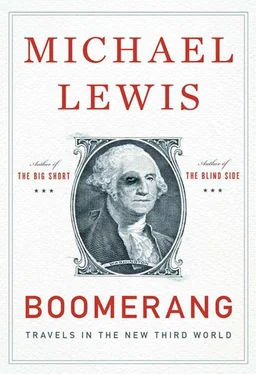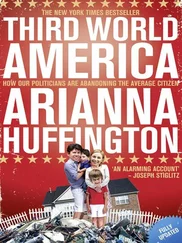At bottom, he says, the Germans were blind to the possibility that the Americans were playing the game by something other than the official rules. The Germans took the rules at their face value: they looked into the history of triple-A-rated bonds and accepted the official story that triple-A-rated bonds were completely risk-free.
This preternatural love of rules almost for their own sake punctuates German finance as it does German life. As it happens, a story had just broken that a German reinsurance company called Munich Re, back in June 2007, or just before the crash, had sponsored a party for its best producers that offered not just chicken dinners and nearest-to-the-pin golf competitions but a blowout with prostitutes in a public bath. In finance, high or low, this sort of thing is of course not unusual. What was striking was how organized the German event was. The company tied white and yellow and red ribbons to the prostitutes to indicate which ones were available to which men. After each sexual encounter the prostitute received a stamp on her arm to indicate how often she had been used. The Germans didn’t just want hookers: they wanted hookers with rules.
Perhaps because they were so enamored of the official rules of finance, the Germans proved especially vulnerable to a false idea the rules encouraged: that there is such a thing as a riskless asset. After all, a triple-A rating was supposed to mean “riskless asset.” There is no such thing as a riskless asset. The reason an asset pays a return is that it carries risk. But the idea of the riskless asset, which peaked about late 2006, overran the investment world, and the Germans fell for it the hardest. I’d heard about this, too, from people on Wall Street who had dealt with German bond buyers. “You have to go back to the German mentality,” one of them had told me. “They say, ‘I’ve ticked all the boxes. There is no risk.’ It was form over substance. You work with Germans, and—I can’t emphasize this enough—they are not natural risk takers. They are genetically disposed to fucking it up.” So long as a bond looked clean on the outside, the Germans allowed it to become as dirty on the inside as Wall Street could make it.
The point Röthig wants to stress to me now is that it didn’t matter what was on the inside. IKB had to be rescued by a state-owned bank on July 28, 2007. Against capital of roughly $4 billion it had lost more than $15 billion. As it collapsed, the German media wanted to know how many U.S. subprime bonds these German bankers had gobbled up. IKB’s CEO, Stefan Ortseifen, said publicly that IKB owned almost no subprime bonds at all—which is why he’s now charged with misleading investors. “He was telling the truth,” says Röthig. “He didn’t think he owned any subprime. They weren’t able to give any correct numbers of the amount of subprime they had, because they didn’t know. The IKB monitoring systems did not make a distinction between subprime and prime mortgages. And that’s why it happened.” Back in 2005, Röthig says, he proposed to build a system to track more precisely what loans were behind the complex bonds they were buying from Wall Street firms, but IKB’s management didn’t want to spend the money. “I told them you have a portfolio of twenty billion dollars, you are making two hundred million dollars a year and you are denying me six point five million. But they didn’t want to do it.”
FOR THE THIRD time in as many days we cross the border without being able to see it, and spend twenty minutes trying to work out if we are in East or West Germany. Charlotte was born and raised in the East German city of Leipzig, but she is no less uncertain than I am about which former country we are in. “You just would not know anymore unless you are told,” she says. “They have to put up a sign to mark it.” A landscape once scarred by trenches and barbed wire and minefields exhibits not so much as a ripple. On the outside, at least, it’s perfectly clean. Somewhere near this former border we pull off the road into a gas station. It has three pumps in a narrow channel without space to maneuver or to pass. The three drivers filling their gas tanks need to do it together, and move along together, for if any one driver dawdles, everyone else must wait. No driver dawdles. The German drivers service their cars with the efficiency of a pit crew. Precisely because the arrangement is so archaic, Charlotte guesses we must still be in West Germany. “You would never find this kind of gas station in East Germany,” she says. “Everything in East Germany is new.” She also claims she can guess at sight whether a person, and especially a man, is from the east or the west. “West Germans are much prouder. They stand straight. East Germans are more likely to slouch. West Germans think East Germans are lazy.”
“East Germans are the Greeks of Germany,” I say.
“Be careful,” she says.
From Düsseldorf we drive to Leipzig, and from Leipzig we hop a train to Hamburg to find the mud wrestling. Along the way she humors me by parsing her native tongue for signs of anality. “ Kackwurst is the term for feces,” she says grudgingly. “It literally means shit sausage. And it’s horrible. When I see sausages I can’t think of anything else.” She thinks a moment. “ Bescheissen : someone shit on you. Klugscheisser : an intelligence shitter.
“If you have a lot of money,” she continues, “you are said to shit money: Geldscheisser. ” She rips a handful of other examples off the top of her head, a little shocked by how fertile is this line of thinking, before she says, “And if you find yourself in a bad situation, you say, ‘ Die Kacke ist am dampfen the shit is steaming.’” She stops and appears to realize she is encouraging a theory of German national character.
“It’s just in the words,” she says.
“Sure it is.”
“It doesn’t mean it applies.”
Outside of Hamburg we stopped for lunch at a farm owned by a man named Wilhelm Nölling, a German economist now in his seventies but with the kick and bite of a much younger man. He has the chiseled features and silver hair of a patrician but the vocal cords of a bleacher bum. “The Greeks want us to pay their lunch!” he bellows, as he gives me a tour of his private goat pen. “That is why they are rioting in the streets! Baaa!” Back when the idea of the euro was being bandied about, Nölling had been a governor of the Bundesbank. From the moment the discussion turned serious he has railed against the euro. He’d written one mournful pamphlet called “Good-bye to the Deutsche Mark?” and another, more declarative pamphlet called “The Euro: A Journey to Hell.” Together with three other prominent German economists and financial leaders he’d filed a lawsuit, still wending its way through the German courts, challenging the euro on constitutional grounds. Just before the deutsche mark got scrapped, Nölling had argued to the Bundesbank that they should just keep all the notes. “I said, ‘Don’t shred it!” he now says with great gusto, leaping out of an armchair in the living room of his farmhouse. “I said, ‘Pile it all up, put it in a room, in case we need it later!’”
He finds himself stuck: he knows that he is engaged in an exercise futile and pointless. “Can you turn this back?” he says. “We know we can’t turn this back. If they say, ‘Okay, we were wrong, you were right,’ what do you do? That is the hundred-thousand-million-dollar question.” He thinks he knows what should be done but doesn’t think Germans are capable of doing it. The idea he and his fellow dissident German economists have cooked up is to split the European Union in two for financial purposes. One euro, a kind of second-string currency, would be issued for, and used by, the deadbeat countries—Greece, Portugal, Spain, Italy, and so on. The first-string euro would be used by “the homogenous countries, the ones you can rely on.” He lists these reliable countries: Germany, Austria, Belgium, the Netherlands, Finland, and (he hesitates for a second over this) France.
Читать дальше












